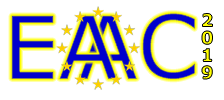Speaker
Description
Laser-accelerated particles (protons and electrons alike) feature very short duration (often below 1 ps) and high peak current (~ kA). These characteristics makes them suitable for depositing dose in living tissues over a timescale at the heterogeneous chemistry level, at peak doserates exceeding several $10^9$ Gy/min. The effect of fractionated dose deposition and ultra-high dose rate has recently gained much attention due to the discovery of the FLASH effect, showing that high doses delivered in short times would produce less secondary effects in healthy tissues, while keeping intact their therapeutic potential on cancerous cells. The construction of laser-driven pre-clinical irradiation line could represent a perfectly adapted tool for the exploration on fundamental effects in radiation biology and chemistry towards the definition of new therapeutic strategies.
During recent experimental activities in LOA a fully characterized proton transport line with online dosimetry was setup, enabling two successful experimental campaigns in radiation biology.
Recent results will be presented, and their pertinence for the transition towards application of laser-driven particle sources to medicine will be discussed. Perspectives for the extension to the use of laser-accelerated protons and electrons for in-vitro and in-vivo experiments will also be presented.

